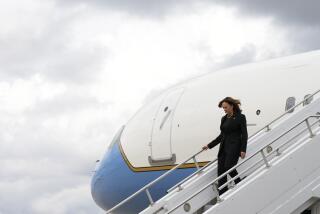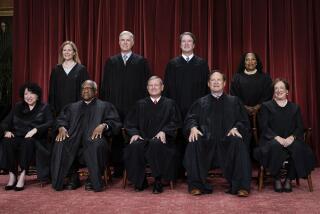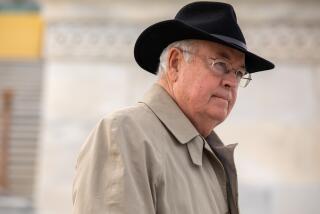Starr’s Probe Expands to Include Travel Office Statements
- Share via
WASHINGTON — Events leading up to the 1993 firing of White House travel office employees took on added significance Friday when Whitewater independent counsel Kenneth W. Starr assumed control of an investigation to determine whether a former presidential aide made false statements to cover up the role of First Lady Hillary Rodham Clinton.
In legal papers filed with a panel of appellate judges, Atty. Gen. Janet Reno recommended that Starr expand his jurisdiction to investigate allegedly false statements made to congressional investigators by former White House aide David Watkins. The judges agreed with Reno that Starr rather than the Justice Department should look into the matter, and they ordered Starr’s investigation expanded.
The suddenly deepening inquiry has its roots in a 3-year-old congressional investigation and hearings by a House committee last fall and early this year.
Watkins, who was White House director of administration, insisted in a December 1993 interview with the General Accounting Office that the first lady was not involved in the decision seven months earlier to fire all seven employees of the travel office. He said he “did not consider the first lady to be exerting pressure on him,” according to a GAO report. As the investigative arm of Congress, the GAO was looking into the matter at the request of the House Government Reform and Oversight Committee.
However, earlier this year, memos and handwritten notes that the committee subpoenaed from Watkins indicated that Mrs. Clinton had pushed for the travel office shake-up at the urging of Hollywood producer Harry Thomason, a close friend of the Clintons. Thomason had part interest in a travel-related company.
In one 1993 memo, Watkins said he knew there would be “hell to pay” if he “failed to take swift and decisive action in conformity with the first lady’s wishes.”
Watkins, appearing before the House committee two months ago, did not dispute the authenticity of his contemporaneous memos. But he insisted to members of Congress that “it was my decision to terminate the travel office employees” and that “the first lady did not direct me to fire them.”
Earlier this week, Mrs. Clinton made the same points in written answers to questions posed by the panel headed by Rep. William F. Clinger Jr. (R-Pa.), saying that she had no role in the firings and does not recall details of a conversation with Watkins.
Another memo written by Watkins in the fall of 1993 suggested that he may have misled GAO investigators deliberately in an earlier interview. He wrote to then Chief of Staff Thomas “Mack” McLarty that the memo “is my first attempt to be sure the record is straight, something I have not done in previous conversations with investigators--where I have been as protective and vague as possible.”
Watkins said in this memo that he felt great pressure to fire the employees coming from the first lady through McLarty and then-White House Deputy Counsel Vincent Foster, who committed suicide in July 1993.
Reno, in her court papers Friday, said that the GAO had found “material inconsistencies” between Watkins’ notes and what he had told the GAO at an earlier point. She said Starr was already investigating possible false statements made to his office about the travel office firings and that it would be “appropriate” to expand his inquiry to include Watkins’ statements as well.
Watkins, a former Little Rock advertising director, was fired in 1994 for taking a White House helicopter to play golf in suburban Maryland.
Times staff writer Ronald J. Ostrow contributed to this story.
More to Read
Sign up for Essential California
The most important California stories and recommendations in your inbox every morning.
You may occasionally receive promotional content from the Los Angeles Times.













